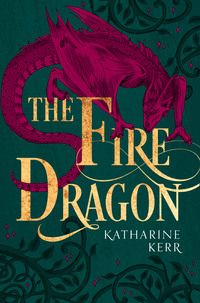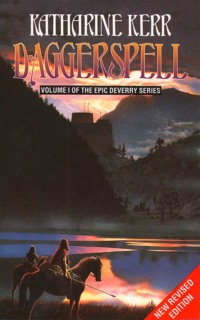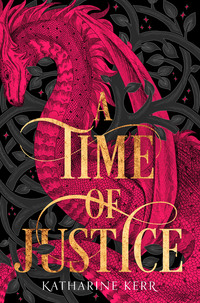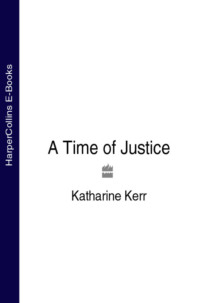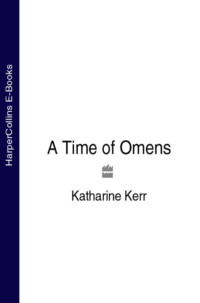
Полная версия
The Silver Mage
‘Well, what to do with it?’ Val said briskly. ‘I’d enjoy smashing it to bits, certainly, but since we don’t truly understand this bit of work, I’m hesitant. Besides, it doesn’t seem evil to me, now that I look at it.’
‘Was the crystal evil, or was it the lust for the crystal that brought the evil?’
‘A very good point.’ With a sigh Val wrapped the black stone up again in the shirt. ‘Well, I’ll keep it for a few days at least, to study its emanations. Evandar’s little gifts – by the Black Sun, how much trouble they’ve caused! The rose ring, this crystal, and now that wretched book.’
Some words they had, for dealing with those, either spiritfolk or flesh-folk, who knew Elvish words, but among themselves, the spirits of the dragon book used shape and colour to convey what thoughts they needed to share. Some leapt up in long iceblue lines, others agreed in a dim blue glow: danger, terrible danger, despite the smothering dark around the book they guarded.
Evandar, where is Evandar? They asked each other repeatedly by creating images of his various shapes, flashing like lightning in the dark. They summoned their lords and petitioned them. They brazenly asked their king, when at last he deigned to notice them. Where is the spirit known as Evandar?
Answers never came. No one knew.
‘You know, it’s odd,’ Branna said, ‘but I keep thinking about the dragon book. I wonder if we’ll ever find it?’
‘I do hope so,’ Grallezar said. ‘Without it, I doubt me we can ever turn the silver wyrm back into his true form.’
‘I’ve been thinking about that, too. Since dragons have some kind of instinct for dweomer, couldn’t we just teach him how to transform himself?’
‘After many a long year, mayhap. And mayhap the turning would fail and kill him, too.’ Grallezar sucked a thoughtful fang. ‘Did Dalla ever tell you how Evandar worked the dweomer?’
‘She did. He made some kind of dragon-shaped mould out of astral substance and wound it round Rhodry. Then the physical matter poured into it.’
‘Just so. And here be the crux of the thing. The turning itself may well be simple enough, once we find the key. But what then do we do with the astral substance that did make the mould? It be heavily charged with dweomer – twice so charged, once we free it from the man inside. I doubt me if a simple touch of a pentagram will turn it harmless and send it on its way.’
‘Oh. I’d not thought of that.’
‘The problem be a bit much for an apprentice, truly. I know you be eager to help with this working, but dealing with that dragon simulacrum had best be left to me and Dalla. Other work will come your way.’
‘Very well, then. Of course I’ll do as you say.’
Grallezar smiled briefly. ‘It gladdens my heart to see you listen to your master in the craft.’
‘Well, after what nearly happened to Neb –’
‘Indeed. At least some good did come of it, since you did take the lesson to heart.’
‘I have. I promise. But it’s a bit more than just my wanting to help with the working when it comes. I feel like I have to do this for some reason I don’t understand. I mean, I know Jill wanted to spare him this wyrd, but it seems like there’s more to it than that.’
‘Indeed?’ Grallezar paused to study her face for a moment. ‘That be a good theme for your meditations, then. See what symbols rise around your thoughts, and we shall discuss them.’
‘Well and good. I’ll do that.’ She paused, glancing to one side, where she’d seen a flash of movement. Her grey gnome had appeared. He sat down cross-legged, imitating her, and began picking his nose. When she shook a finger at him, he vanished. Grallezar rolled her eyes at his antics, but she was smiling.
‘Now it be time to stop thinking of dragons and the like,’ Grallezar said. ‘Let me hear you recite the true names of the spirit lords of each sphere.’
With a sigh, Branna began the lesson. Thinking about the silver wyrm held a great deal more interest than all the memorization that dweomer entails, but she knew that the one was the key to the other.
Dallandra, however, cut that particular lesson short. Branna heard her calling Grallezar’s name in a voice brimming with excitement. With a sigh Grallezar got up and stuck her head out.
‘I don’t mean to interrupt,’ Dallandra was saying, ‘but –’
‘Do come in,’ Grallezar said. ‘Being as you’ve interrupted already.’
When Dallandra ducked under the tent flap and came in, she was smiling, her eyes gleaming with delight.
‘And what be all this?’ Grallezar said.
‘I’ve just had a talk with Laz,’ Dallandra said. ‘He’s told me about the true nature of Haen Marn, so my apologies –’
‘The interruption, it be as naught.’ Grallezar pointed at a cushion. ‘Sit you down and tell.’
‘I shall do exactly that.’ Dallandra flung her arms into the air and danced a few steps. ‘It bears on the dragon book, too. Neither of them really exist.’
‘Hah!’ Grallezar said. ‘So we did wonder.’ She glanced at Branna and laughed. ‘You do look dumbfounded utterly.’
‘I am,’ Branna said. ‘Or do you mean, they don’t exist on the physical plane like ordinary matter?’
‘Just that.’ Dallandra sat down on a cushion. ‘You learn fast.’
After he spent some futile days searching for Berwynna’s lost mule and the book it carried, Rori took a round-about route back to the royal alar. On his previous scouting trips, he’d seen parties of Horsekin raiders on the move. Somewhere they had to have a central force, most likely one that was travelling toward the new fort he’d seen a-building. The logical starting point for this central army lay near Taenbalapan and Braemel. Braemel, Bravelmelim as it was known in the old days, lay more west than north. He passed over fields and pastures tucked into the mountain valleys and terraces, green with crops, that climbed the lower hills like steps. Now and then he saw flocks of sheep as well as cows grazing in the mountain meadows. That first night he picked off a cow, in fact, for his dinner and found her fat and tasty.
In the morning he reached Braemel, a prosperous-looking place lying in a broad valley, a semi-circle of houses set along straight streets, with the river along one edge of the town and good stone walls surrounding it on the other three sides. A straggle of huts stood outside the west gate, but when he flew low enough, he could see that they were guard stations and barracks. His shadow, vast in the morning sun, swept across the road like an omen. Shouting, soldiers ran out to watch him as he spiralled higher, well out of arrow range, and flew on.
Tanbalapalim, to give it its ancient name, lay spread across three hills. A river cut through the town, entering and leaving through breaches in the outer walls. In the old days, two graceful bridges made of stone overlaid with different colours of marble had arched over the smooth-flowing water like twin rainbows. Although stubby stone piers still jutted from the river banks, the bands of marble had been scavenged for other projects. The Gel da’Thae had built new bridges of wood reinforced here and there with plain stone.
When Rori flew over the town, he saw only one wooden bridge still whole and the other, burned down to the water line. Fire had swept through the eastern sectors, leaving nothing standing but the occasional blackened stone wall. Ashes covered the ground in sweeps of grey. Had there been riots, he wondered, when the Gel da’Thae realized that their new Horsekin neighbours had taken control of their city? The western half still stood, but as he circled far above it, he saw only a few people moving in the streets.
Not far south of Tanbalapalim, Rori found what he’d been looking for. An army marched down the road beside the river, several thousand men by his rough estimate, more than half of them riders, the rest spearmen. Behind them trailed a long supply train, and small boats glided beside them on the slow-flowing river. He circled them several times to study, then headed for the mountains to the west. At a mountain pass above Braemel lay another ancient site. On the off-chance that the Horsekin had decided to occupy it as well, Rori flew there, only to find it deserted.
As he drifted on the wind high above it, Rori saw why the ancestors of the Westfolk had named it Garanbeltangim, the ‘Reaching Mountain’. Ancient layers and slabs of rock make up the Western Mountains, all twisted and folded, heaved out of the earth by some colossal cataclysm, perhaps, then washed bare by millennia of rain and snow. The old tales of giants may be true, that in their final war they threw huge rocks and slabs at one another and in the process built the peaks of the far west. Be that as it may, the highest peak of all is Garangvah, to give it its modern name. Like hands three huge slabs of sea-stone reach up to the sky and form a semi-circle around the high terraces that once held Ranadar’s fortress.
The Hordes from the north never conquered Garangvah, though they did take over the lower slopes and the farms that had previously supported Ranadar and his men. For an entire year the fortress held out, living on its stores, until the last grain of wheat, the last fleck of cheese rind, and the last mouse and rat had been eaten. Just when starvation threatened the defeat that the Horsekin couldn’t deliver, the Horde broke the siege and fled. Their look-outs had spotted a relieving force headed their way.
While the rescuers did bring food, they also brought the worst news of all, that Rinbaladelan had fallen, and the Vale of Roses lay destroyed, covered in ashes and cinders. Ranadar was king of precisely nothing worth ruling. Revenge alone remained to him. For its sake, he left the Reaching Mountain, and he never returned. The limestone slabs continued to cast their shadows over the palaces and walls, the storehouses and the towers, the outbuildings and alleyways. The roofs fell in with time and the snows. Mosses, the sparse mountain grass, and a scattering of twisted, stunted trees pried apart the fine paving stones of the courtyards.
By the time that Rori flew over Garangvah, the palaces and outbuildings had worn down to mere stubs of walls and heaps of rubble. The wind had blown soil over them, and grass had sprouted. A few small trees stood upon them. Doubtless their roots would soon destroy whatever fragments of splendour still lay hidden.
The stone outer walls, however, stood strong. Although they’d been built without mortar, the masons had shaped and fitted each stone to those below and beside it so carefully, so tightly, that the walls had survived for a thousand years and more. Rori circled overhead, looking for Horsekin, but saw no sign of occupation except for some ancient nests, probably built by eagles, in the towers. A few foxes darted across the ruined courtyard to their burrows in the palace mound to hide from the silver apparition in their sky.
Since Rori had flown all day, he needed immediate rest. He found a place on the outer wall where the stonework looked as if it could support his weight. He landed cautiously, wings akimbo, ready to leap skyward should the wall crumble under him, then settled when it held. From his perch he could see down the slopes to the hazy landscape below, a thing of patchy grass and tumbled rock where once had lain fertile terraces.
In his mind, however, his dragon mind with its long link into the past, he could see much further. He found himself remembering the long slope of another hill, covered with brush and boulders, choked with dust in the late summer heat. That hill was far to the north, he thought, farther even than I realized at the time, not that the distance mattered, in the end.
PART I
The Northlands Autumn
Five Years Before the Founding of the Holy City
The Greggyn astrologers tell us that the end of a thing lies curled in its beginning like a tree inside an acorn.
The Secret Book of Cadwallon the Druid
‘You should leave me,’ Gerontos said. ‘Just leave me here and save yourselves.’
‘Never!’ Rhodorix laid a blood-stained hand on his brother’s shoulder, then glanced at the druid, standing nearby. ‘Think your god will intervene and save us?’
Galerinos merely shook his head, too exhausted to speak, and leaned, as bent as an old man, onto his heavy staff. Rhodorix considered his cousin’s wounds, slight if Galerinos had been a warrior, but grave enough for a softer man. The young priest’s arms, bare in his linen tunic, bled from a hundred scratches, the work of the thorny bushes and low-growing trees of this stretch of countryside. Blood stained the hem of his tunic as well from the cuts and scratches on his bare thighs.
All that hot autumn day the three of them had been scrambling through the underbrush in the rocky hills, trying to find a hiding place, taking turns supporting Gerontos, whose broken leg could bear no weight.
‘No use in you dying with me, Rhoddo,’ Gerontos said. ‘Either of you.’
Rhodorix helped his brother sit down among the boulders. Gerontos’s leg, snapped below the knee by a savage axe, had turned purplish-black; blood oozed from under the bandages Rhodorix had improvised from strips of their tunics. He helped Gerontos settle himself, then got up and looked down the long slope of the hill to the valley below. Somewhere among the tall grass and the patches of forest waited their clan and safety, somewhere too far to see. Unfortunately, he could all too clearly see a small mob of their enemies, still some distance below them, but coming inexorably up the hill.
Just after dawn that morning, Rhodorix, eldest son of the Dragon clan, and his warband had been guarding Galerinos as he dowsed for water. Instead of a spring they’d discovered a trap set by the white savages. All fourteen of his men lay dead down in the valley; only he himself, his brother Gerontos, and the druid had survived the attack. Unhorsed, desperate, they had taken too many wrong paths during their attempt to escape.
I made too many bad decisions, not anyone else but me, Rhodorix thought. ‘The shame’s mine,’ he said aloud. ‘Better I just die with you here. Even if we got back, what am I going to tell the vergobretes?’
Neither Galerinos nor his brother could look him in the face. Neither said a word.
‘But Gallo, you can hide or suchlike,’ Rhoddo went on. ‘Get away after they kill us.’
‘If Great Bel wants me to die, then die I will,’ Galerinos said. ‘There’s no use in running.’
‘Well, how by the hells do you know what he wants? You keep praying, and we keep getting more and more lost.’
‘That’s why I think he wants us to die. If he’d only led us to water right away –’
A cry drifted up on the hot and dusty air, a shriek of triumph, an answering howl from a band of men.
‘They’ve spotted us,’ Rhodorix said. ‘Naught else matters now.’
‘Help me up!’ Gerontos said. ‘Cursed if I’ll die sitting down.’
Between them Rhodorix and Galerinos hauled him up and helped him prop himself against a boulder. Gerro’s face had gone pale under the smears of dust. Sweat plastered his dark hair to his forehead. Had his leg been sound, Rhodorix knew, the two of them could have scored some kills before the superior numbers against them brought them down. As it was, they could no longer fight back to back. Not long now, he thought. Soon we’ll all be drinking in the Otherlands.
Twelve men were making their way uphill through the rocks and the underbrush, twelve savages with manes of dark hair and milk-white skin, scored with the black lines and dots of tattoos. Ten of them carried spears; the others bore the heavy war-axes that had so efficiently shattered the Devetians’ wooden shields that morning. Some hundred yards downhill they paused to argue among themselves, pushing each other in their eagerness to be the first to attack.
‘Gallo, run!’ Rhodorix snarled. ‘Get out of here now!’
‘I won’t.’ The young priest stepped forward and raised his staff to the sky. ‘I’ll beg Bel’s help and try to curse them.’
‘A load of horseshit would do us more good than that.’
Galerinos ignored him and took another step forward. He stared straight at the enemy and began to chant, a low rumble of sound at first, then louder and louder. His words came punctuated with deep breaths, and every breath seemed to draw power from the very air around him. Each curse vibrated like a swarm of angry wasps as it streamed toward the enemy below. Rhodorix had never heard such a sound out of any man’s mouth. He felt himself turn cold as the chant rose and fell. More to the point, their enemies seemed as transfixed as he. They stood and listened, weapons slack in their hands as Galerinos cursed them, their women, their offspring, their clans, their future offspring, their crops, their herds, and anything else they might touch or cherish.
With one last bellow of sound, Galerinos cried out, ‘Begone!’ and swung his staff down to point straight at them. All of the ill luck of the curse sprang out at them – and a good deal more. With a hiss and crackle like lightning from a clear sky, blue fire leapt from the staff in a long sizzling bolt and struck among them. They screamed, began to back away, screamed again as a further shower of blue flames burst out of the staff and struck. One man fell backward, writhing and foaming at the mouth. Two others grabbed him, but he continued to twitch and foam. All at once the enemy band broke. They ran this way and that, for a brief moment hysterical and leaderless, then turned and began to race downhill, howling as they ran. A last bolt of blue fire followed them.
Galerinos stood staring, his mouth half-open, his eyes stunned.
‘What did you do?’ Rhodorix grabbed him by the shoulders. ‘How did you do that?’
‘I don’t know.’
‘What – you have to know!’
‘The curse never worked like that before! Back in the homeland, I mean.’ Galerinos paused to gasp for breath. ‘You heard me. I asked the god to send ill-luck down upon them, and from the look of things, I’d say he did.’
Laughter sounded behind them, an odd laugh, more like the plucking of a cithara’s strings than a sound made by a throat. Rhodorix spun around. The strangest man he’d ever seen stood leaning against a tree trunk and smiling at them. A slender fellow, he had yellow hair as bright as the paint on a Rhwmani standard, and his lips were a paint-pot red as well, while his eyes gleamed sky blue. His ears, however, were the strangest feature of all, long and furled like lily buds.
‘I doubt if your god had anything to do with those bolts of fire,’ the fellow said. ‘You know sorcery, don’t you?’
‘What?’ Gallo gaped at him like a dolt. ‘But that’s unclean!’
‘Sorcery such as my friend Caswallinos studies is not unclean.’ He pried himself off the tree trunk and walked over. ‘My name, by the by, is Evandar.’
Rhodorix dropped to his knees. ‘Forgive my brother, Mighty One,’ he said. ‘He can’t kneel before you. He’s badly hurt.’
‘So I see,’ Evandar said to him, then turned back to Galerinos. ‘Your master, in fact, that very same Caswallinos, asked if I might find you for him. Come walk with me.’
Galerinos obeyed, striding uphill to join the being that everyone in the migration of the Devetii assumed was a god. Together they moved a few paces off. As Rhodorix got up to keep a watch downhill, he felt the air turn cool around him. He glanced up and saw a mist forming in the sky, a strange opalescent cloud shot through with pale lavender gleams and glints. The hairs on the back of his neck rose.
‘Ye gods!’ Gerontos said abruptly. ‘They’re gone!’
Rhodorix spun around to look where his brother pointed. Sure enough, Evandar and Galerinos both had vanished. As he watched, the cloud of peculiar mist began to shrink into a swirl of grey and lavender. In a heartbeat it had disappeared as well. Rhodorix tried to speak, then merely shook his head in bafflement.
‘Do you think Gallo will bring us back some aid?’ Gerontos said.
‘I hope so,’ Rhodorix said. ‘I’d think so.’ Yet he felt that he lied. Why would the clan care about two shamed men such as themselves? Especially me, he thought, I’m the one who led us right into the trap.
With a curse and a groan of pain, Gerontos let himself slide down against the boulder until he sat upon the ground. Rhodorix sat down next to him and prayed that the gods would allow his clan to take mercy on his brother.
To Galerinos it seemed as if he and Evandar had walked but a few feet away. The god, as he thought of the being next to him, paused and turned to face him.
‘Your master worried when you lads didn’t come back,’ Evandar said. ‘He and some of the other men found that battlefield, if you can call it that. A slaughter yard, more like.’
‘So it was,’ Galerinos said. ‘I’m surprised that any of us got away.’
‘They assumed you’d been taken prisoner, so I said I’d fetch you back.’
‘You have my humble thanks.’ Galerinos glanced around and saw nothing but mist all around them. ‘Where are the other two?’
‘Back where I left them. I told Casso that I’d bring you back. He said naught about your friends.’
‘I can’t desert them!’
‘You already have.’ Evandar grinned with the wide-eyed innocence of a small child and pointed off in the distance.
Galerinos spun around to look downhill. The mist was lifting, revealing a clear view of the camp, only some five hundred yards away. Horses, wagons, people – they spread out in a dusty spiral on the plain, desolate except for grass, crisping in the autumn heat, and a few straggly trees. A faint umbrella of brown dust hung in the air above the conjoint tribes of the Devetii, refugees from the Rhwmani wars.
Out in the open grass stood Caswallinos, his hands on his hips, his staff caught between his side and the crook of his left elbow. For someone so blessed by divine power, he was an unprepossessing fellow, almost as skinny as his staff and bald except for a fuzz of grey stubble round the back of his skull. As they hurried down to join him, Galerinos was expecting his master to kneel before the god. Instead, the old man merely smiled and bobbed his head in Evandar’s direction.
‘My humble thanks for returning this stray colt to me,’ Caswallinos said. ‘I take it the other lads are all dead.’
‘Two were still alive last I saw them,’ Evandar said.
‘Then where are they?’
‘Still up on the mountain. They were wearing iron, and so I left them there.’
Caswallinos sighed and ran a hand over his face as if he were profoundly weary. ‘What have I told you about wyrd?’ he said. ‘And how things undone redound upon you?’
‘Do you think those two are part of my wyrd?’ Evandar said.
‘They are now, since you left them somewhere to die.’
‘But they were wearing iron.’ Evandar stamped his foot like an angry woman. ‘Iron swords, iron shirts. It aches me.’
‘I know that,’ Caswallinos said. ‘No one was asking you to touch them.’
The supposed god – Galerinos found his belief in Evandar’s divinity crumbling – stared at the druid for a long moment, then turned away. He seemed to be watching the white clouds drifting in from the south.
‘We need our two lads back,’ Caswallinos said, ‘and we need water.’
‘You’re not far from a big river.’ Evandar kept his back to the druid. ‘Head to where the sun rises. It won’t take you long to reach it.’
‘I wish you’d told me that this morning.’
Evandar merely shrugged.
‘If you had,’ Caswallinos went on, ‘those lads wouldn’t be dead, and the last two stranded on a mountainside.’
‘Oh.’ Evandar turned around to face him. ‘Mayhap their wyrd is mine, then.’
‘It is.’
Evandar pouted down at the ground for a long moment. ‘I suppose you’re right,’ he said at last. ‘But I shan’t bring them here.’
‘Why not?’
‘Because you’ll be leaving to find that river.’
‘Will you bring them to me there?’
‘I shan’t.’


